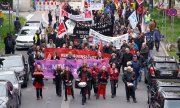Nothing but empty words from the left
Not even the leftist opposition seriously addresses workers' rights on Labour Day, Jutarnji list writes annoyed:
“Without advancing any content or progressive ideas - let alone controversies to fuel public discussion - the politicians of the social democratic and left-wing parliamentary parties strung together messages that no one can remember the next day. ... Croatia has been discussing a new labour law for a year and a half, the social partners can't see eye to eye, and the government is taking its sweet time coming up with a solution. Of course, the issue of workers' rights isn't the sole preserve of the left, but in all societies it's at the top of the agenda for left-wing parties. Except for here.”
Trade unions outdated but indispensable
The struggle for workers' rights must adapt to the times, demands El País:
“Technological changes, automation, telework and artificial intelligence will expose millions of workers to immediate changes. ... This is a challenge which not only the political parties but also the trade unions must respond to. The latter are finding that younger generations are clearly dissatisfied with outdated trade union structures and strategies. ... The scepticism may be justified, but so is the democratic certainty that nothing would improve for workers if trade unions ceased to exist.”
The exploitation hasn't changed
The problems of the working class have changed in form but not in essence, observes publicist Lajos Köteles in Népszava:
“Traditional labour has been replaced by a much more complicated concept, value creation, the most important element of which is knowledge. And the working class, which was based on manual labour in the past, has been replaced by a society divided in many different ways. Many claim that everything has changed fundamentally, but this is not true. ... The society that earns its living through work is still pitched against the world of the increasingly immodest rich. The forms of exploitation have changed, but the core of the problem remains unchanged to this day.”
May 1 comes one month late
Peščanik complains that nowadays there is more partying than demonstrating on May 1:
“For some time now the Labour Day protests have not been as numerous as the barbecues on the same day. One could even say that the harder it is for workers at work, the fewer there are who express their discontent, at least once a year. ... That is why May Day as International Workers' Day is more reminiscent of April Fool's Day. Because although our workers' rights are at an all-time low, everyone seems happy: politicians, employers and even the workers.”

